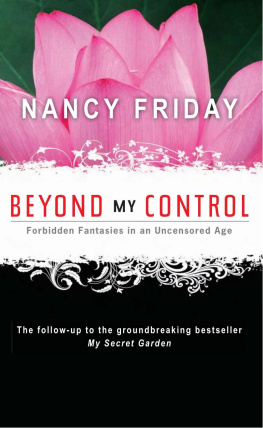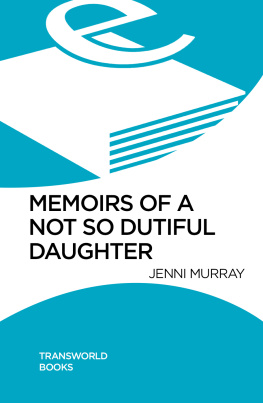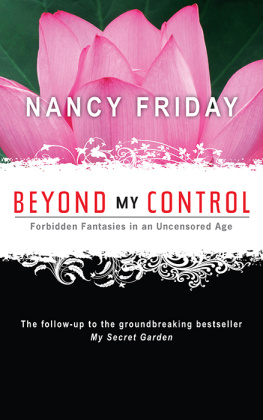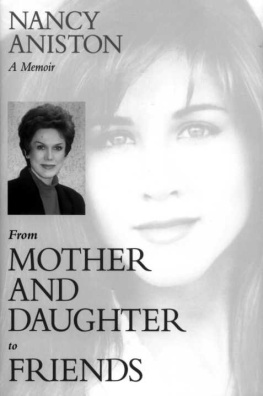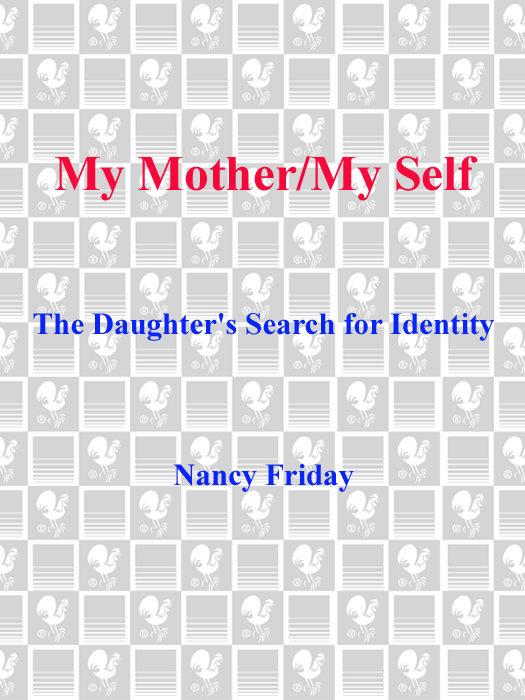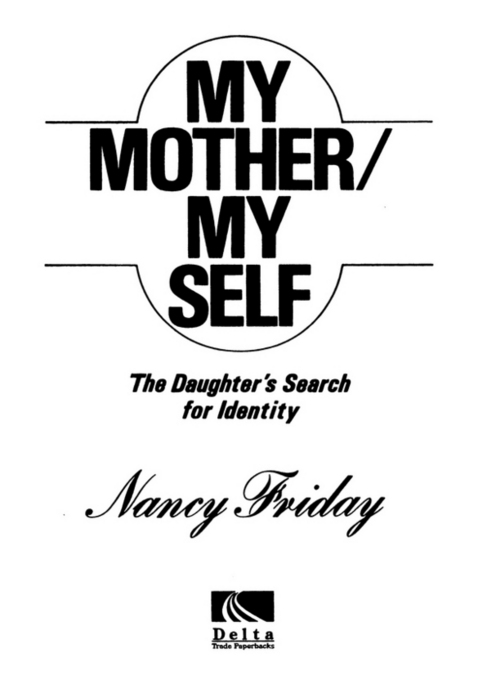High Praise for
Nancy Fridays Perennial Bestseller
MY MOTHER/
MY SELF
A REMARKABLE WORK IF THERE IS ANY WAY TO TURN THE TIDE OF OUR SEXUAL DESTINY THEN NANCY FRIDAY HAS PROVIDED AN EXCELLENT PLACE TO START.Molly Haskell
A LANDMARK STUDY! A MOST IMPORTANT BOOK.Publishers Weekly
IMPORTANT FOR ALL DAUGHTERS, TO UNDERSTAND THE PAST, LEARN ITS LESSONS, AND THEN LET IT GO. Library Journal
FREUD ASKED WHAT DO WOMEN WANT? IN THIS DEEPLY PERCEPTIVE BOOK, NANCY FRIDAY HAS GIVEN US SOME STUNNING ANSWERSNOT ONLY WHAT THEY WANT BUT WHY THEY WANT IT.Eleanor Perry
A Delta Book
Published by
Dell Publishing
a division of
Bantam Doubleday Dell Publishing Group, Inc.
1540 Broadway
New York, New York 10036
Grateful acknowledgment is made for permission to reprint the following material:
Excerpt from PENTIMENTO: A Book of Portraits by Lillian Hellman: used by permission of Little, Brown and Company.
Excerpt from LETTERS HOME by Sylvia Plath: used by permission of Harper & Row, Publishers, Inc.
Lines from Effort at Speech Between Two People by Muriel Rukeyser: reprinted from WATERLILLY FIRE by Muriel Rukeyser by permission of Monica McCall, ICM.
Copyright 1962 by Muriel Rukeyser.
Lines from The Double Image by Anne Sexton: reprinted from TO BEDLAM AND PART WAY BACK by Anne Sexton by permission of Houghton Mifflin Company.
An excerpt from this work first appeared in Good Housekeeping magazine.
Copyright 1977 by Nancy Friday
Introduction copyright 1997 by Nancy Friday
All rights reserved. No part of this book may be reproduced or transmitted in any form or by any means, electronic or mechanical, recording, or by any information storage and retrieval system, without the written permission of the Publisher, except where permitted by law.
The trademark Delta is registered in the U.S. Patent and Trademark Office and in other countries.
eISBN: 978-0-307-76373-0
v3.1
CONTENTS
Chapter 1:
MOTHER LOVE
Chapter 2:
A TIME TO BE CLOSE
Chapter 3:
A TIME TO LET GO
Chapter 4:
BODY IMAGE AND MENSTRUATION
Chapter 5:
COMPETITION
Chapter 6:
THE OTHER GIRLS
Chapter 7:
SURROGATES AND MODELS
Chapter 8:
MEN THE MYSTERY
Chapter 9:
THE LOSS OF VIRGINITY
Chapter 10:
THE SINGLE YEARS
Chapter 11:
MARRIAGE: THE RETURN TO SYMBIOSIS
Chapter 12:
A MOTHER DIES. A DAUGHTER IS BORN. THE CYCLE REPEATS.
INTRODUCTION TO
MY MOTHER / MY SELF
TWENTY YEARS LATER
My husband and I met in 1982, five years after publication of My Mother/My Self. I know that we would not have come together had I not written that book. I wouldnt have seen him, I wouldnt have been the woman he fell in love with. Letting go of my idealized relationship with my own mother, embracing the angers at her that I had worked to conceal all my life, finally freed me to be a grown woman able to make choices about how to lead my own life.
What follows is a conversation between Norman and me on this, the twentieth anniversary of My Mother/My Self. We spoke on our porch in Key West, watching the sun set. We discussed how much the world has changed in these twenty years, but also how much it has remained the same, especially in the complicated, deeply rooted relationship between a mother and her daughter.

What do you mean when you say that everything and nothing has changed in womens lives since your wrote My Mother/My Self?
Well, women are definitely in the workplace to stay and we are slowly but surely gaining economically. To look at us, the way we dress, act, carry ourselves, you would say we are light-years ahead of women twenty or twenty-five years ago. We appear to be much more in charge. Just listen to our voices. Women didnt use to have the power of speech. But emotionally, deep down inside, we are still our mothers good little daughters, or at least we try to be. That leaves us totally confused and it sends a very mixed message to the daughters we have had, not to mention the men we are involved with.
So you are saying that the women I see in the workplace arent separated from their mothers in the way that emotional separation is defined and discussed in My Mother/My Self?
Because we are the same sex as mother, the business of separation is usually harder for a daughter than for a son. The need to define ourselves, to recognize our unique identity as a person separate from the woman with whom we automatically identify, is crucial to becoming genuinely independent. Every argument and difference of opinion comes with the threat that it will lose us her approval, her love. Separation requires practice and repetition of every step away from her and into ourselves so that we can maintain her love even if we are different from her, and even if we argue and compete with her and, yes, win the contest with her. For that to happen she has to be able to say, Go, my darling, and find yourself. My daughter, right or wrong, and we must have the capacity to believe her, to accept that message. To put it bluntly, daughters arent there yet. We havent achieved that degree of separation.
All right, Ill accept that we cannot take the look and sound of women in the workplace as a sure sign of their being individuated. But given how many women are in the workplace today compared with twenty or thirty years agowhen I went to law school there were five women in my class of 200, and when I joined The Wall Street Journal as a reporter the ratio was about the samewhy arent they more individuated? Why do so many affluent, educated women still get pregnant unintentionally? Its baffling. Why doesnt being able to pay your own rent and run an office force a woman to give up what you describe as her baby ties to mommy?
On the contrary, the latter often makes her more like her own mother. It isnt premeditated. It isnt even conscious. In many ways the woman who has been working outside the home often feels somehow incomplete as a woman. Motherhood brings a feeling of being reunited. There can even be a kind of forgiveness of her own mother when she repeats with her daughter the very things she didnt like as a childmothers nagging, mothers overprotectiveness.
Writing My Mother/My Self, I learned about the three levels of change: change in attitude, change in behavior, and change in the unconsciousthe deep-down way that we think about ourselves.
The first two levels came quickly for many women. But we are still struggling at the third level. Reading my book, women often write to me saying how automatically they identified with mother, repeating her mannerisms and behavior, even as it drove them crazy. Now, suddenly, the lightbulb went on and it was easy to say, Ill never think that way again. Opinions can change overnight. So too with behavior. A lot of women told me that it was liberating to realize they could act differently from mother and they wouldnt die. They could be themselves and mother still loved them. She didnt close the door and she didnt stop telephoning. But it can take generations to change the unconscious ways in which we think about ourselves.





